United States

How Cities Are Regulating the Sharing Economy
Compiled from interviews conducted with city officials, this National League of Cities report gives us a regulator's-eye-view of the sharing economy. Among the topics discussed are equity, taxation, and data transparency.
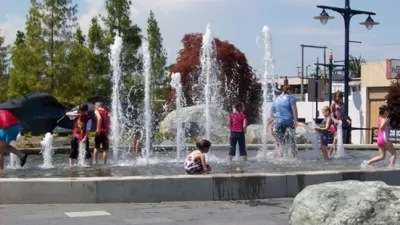
Family-Friendly Downtown Living
What helps make a downtown family friendly? Safe places to play, safe streets, good schools and attainable housing, writes Jennifer Hill.
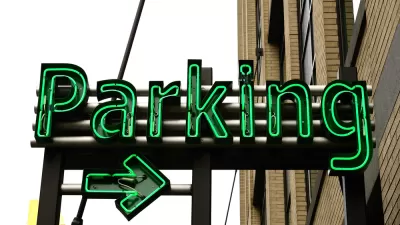
Book Review: Before 'Park' Became a Verb
With so much to learn just by reading a Wall Street Journal book review of "Bike Battles: A History of Sharing the American Road" by James Longhurst, history professor at University of Wisconsin-La Crosse, imagine what's to learn by reading the book.
Businesses Want Vermont to Adopt Nation's First Carbon Tax
Vermont's legislature will take up the carbon tax proposal this week. The tax is construed as largely revenue neutral, i.e., offset by tax decreases and credits, and apply to heating and transportation fuels. Gov. Peter Shumlin has doubts.
With Bloomberg Contribution, Sierra Club Hopes to Shutter Coal Plants
With $60 million in contributions, half from from the former mayor of New York, Michael Bloomberg, the Sierra Club will embark on one of its biggest campaigns: close half of the nation's coal power plants by 2017. Plus, a new coal rule goes to court.
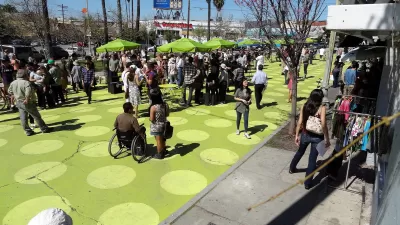
Against Generic Placemaking
'Placemaking,' the process by which cities and developers supposedly create appealing public spaces, is in a crisis, writes critic James Russell. Too many "made" places are generic and lack true relevance to the cities that build them.

Op-Ed: Where GOP Is Strong, Cities Receive Less
When it comes to federal appropriations, urban areas in states dominated by rural Republicans are at a distinct disadvantage. In search of lobbying power, metros in affected states are banding together.
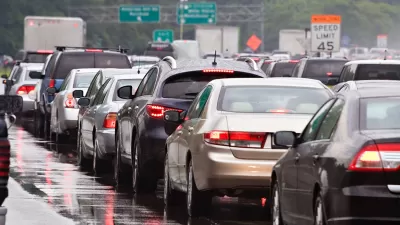
'Jobs Sprawl' Plagues Cleveland Commutes
Research from Brookings puts Cleveland in last place for improving access to jobs from 2000 through 2012. And jobs sprawl is up throughout the rest of the country as well.
The Fear Factor Behind the Success of Shared Streets
An editorial explains that the fear inspired by shared streets—the idea that pedestrians, bikes, and cars have equal claim to navigate the street without the regulatory layer implemented by traffic engineers—is exactly why they work.
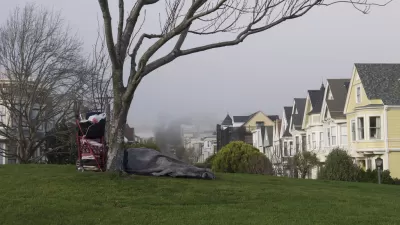
Study: Income Inequality Lowers Life Expectancy
Research suggests a correlation between regional income inequality and poorer health. Several statistical and sociological causes may come into play.
Friday Funny? The Onion Imagines the Future of the Hit and Run
Satire is supposed to make us uncomfortable. A recent totally fake news report imagining hit-and-run technology for self-driving cars (called the "Culpability-Evasion System") definitely succeeded there.
Friday Eye Candy: Mapping the Country's Seasonal Bloom
Wondering when and where spring will bloom? The U.S. Forest Service has just the map to lead you to the fruits of your seasonal desires.
Movement on the Walk Score Leaderboard
The newest rankings of the most walkable cities in the United States, courtesy of Walk Score, contains a few surprises along with its standard annual recognition of New York City.

Quality Public Transit Benefits Land Use Outcomes
New research quantifies public transit impacts on urban development patterns, and resulting benefits. Current transit services reduces U.S. urban land consumption by 27 percent, which reduces VMT, fuel consumption and pollution emissions 8 percent.
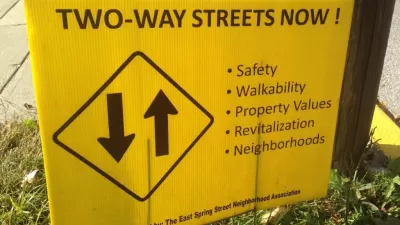
'Two-Ways' to Fix Our Neighborhoods
Expanding on earlier research about the impacts of one-way streets on outcomes such as public health and property values, a new study examines a citywide case study in Louisville.
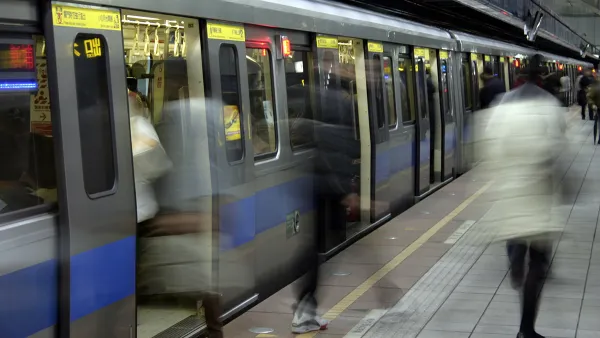
U.S. Subway Car Design Behind the Curve
Yonah Freemark examines U.S. subway systems and notes the lack of "open gangways" (i.e., the space between the cars). Only in the U.S. do doors separate cars. What gives?

Where 20-Somethings Can Expect the Highest Rents
HotPads, an apartment listing site, has produced a new study finding the cities with the highest rent burden for residents in their 20s. Ana Swanson reports on the study and provides insight into its findings.
Recession Success Story: Walkable Commercial Areas
New data show the resilience of walkable commercial areas through the recent recession. Parking minimums, however, prevent new projects from taking advantage of the strengths of such development patterns.
'Most Endangered River' in the United States: the Colorado River in the Grand Canyon
American Rivers' list of the "Most Endangered" U.S. rivers provides an annual reminder of the abuse waterways bear in the name of the country's economy and culture.
Survey: Interest in Buying a Home Hits All-Time Low
Despite many signs of a housing recovery around the country, the most recent survey by Fannie Mae indicates that more Americans than ever aren't sold on the idea of owning a home.
Pagination
Urban Design for Planners 1: Software Tools
This six-course series explores essential urban design concepts using open source software and equips planners with the tools they need to participate fully in the urban design process.
Planning for Universal Design
Learn the tools for implementing Universal Design in planning regulations.
planning NEXT
Appalachian Highlands Housing Partners
Mpact (founded as Rail~Volution)
City of Camden Redevelopment Agency
City of Astoria
City of Portland
City of Laramie


































